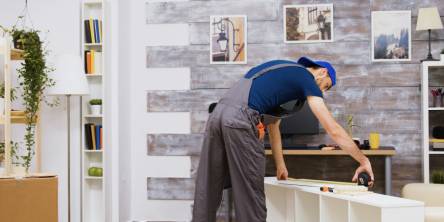The Ultimate Guide for House Moving

Shifting your home one place to another is a big task & you need to prepare a proper plan to execute the process efficiently. It is not easy to remember all the things which need to be done during the house moving process so I have created this house moving guide which will help you.
In this blog, we will help you with some tips and tricks for house moving.
Who doesn’t want to make their next move hassle-free? So, let’s get started!
1. Before 6-8 Weeks
• Plan your transportation and removalist by comparing different movers
• Make a spare folder to keep your inventory and receipt of the hired vehicle, cleaning services and removalist
• Talk to your agent when you can come to pick up the keys.
• Look for storage facilities
• Redirect your mail
• Fill your form of address change through online or post office
• Plan your space based on the size of the rooms
• Conduct garage sale or donate the not required items
• Pack boxes based on the floor plan
• Collect packing materials like tape gum, bubble wrap, markers, labels
• Schedule your repairs
• Get in touch with the local council for rubbish pick up
2. Before 2-4 Weeks
• Cross check with your removalist and make the required arrangements for them
• Fix team for disconnection or connection for utilities at both your homes: Internet, Phone, Cable, gas, water, and electricity
• Discontinue your local memberships and payment plans that are automated
• Change your address details (Below are the places you need to update your address)
• Registration of your pet should be changed or updated with the council
• Organize content insurance
• Make an inventory of items like boxes, furniture to make it easier for your moving day
• Start packing your non-essential things
• Label boxes based on contents and room
• Label your valuable and fragile items
• Prepare your essential box to manage the first few days of your moving
• Place your legal documents and jewellery at the safest place when moving
• Cross check the time with your Conveyancer or Lawyer in case you are buying the new place
• Ask for leave in the office on the day of your moving
Tips if you are renting:
• Notify the landlord prior your moving date
• Return the property as you have received
• Steam clean the carpets
• Take property inspection
3. 1-4 Days Before Moving
• Make an action plan for your moving day
• Defrost and clean your fridge and freezer
• Throw away any flammable and hazardous things
• Keep your essential tools like padlock and screwdrivers handy
• Pack a bag having snacks, bottles, important documents and snacks
• Keep the set of items aside that you have planned to move yourself
4. Moving Day
At your current home:
• Dissemble your bed and remove bedding
• Tick off the boxes and furniture that are uploaded in the moving truck
• Take another tour of the property to make sure nothing is left
• Inform your neighbours about the new address to forward any important thing
• Cross check your address with the movers and take their contact numbers
• Take your important documents with you
• Turn off all the lights and lock doors and windows
• Return the keys
At your new home:
• Check whether all your utilities are working (heating and cooling units, internet, water, phone, electricity, gas)
• Start with cleaning the kitchen
• Make your beds after reaching there
• Start your unpacking process with kitchen and proceed to the bathroom
5. Change of Address Checklist
Here is a change of address checklist to help you inform people and department for your change of address
Financial:
• Home Insurance
• Building Insurance
• Health Insurance Company
• Car Insurance Policy
• Life Policy
• Employer Payroll
• School Principal
Services:
• Mobile Services
• Internet Service
• Water
• Gas
• Cabel
• Electoral Register
• Taxation Department
• Post Office Redirection
• Leasing Company
• Garbage
• Club memberships
• Subscriptions
Health:
• Health Insurance
• Doctor
• Medicare
• Dentist
• Any other healthcare services
Others:
• Newspaper
• Gym Membership
• Pet Registration
• Shops and stores
• Friends, relatives, and regular correspondents
Few things you need to keep in mind are:
• Defrost and drain water from the freezer and refrigerator
• Disconnect and drain water from the washing machine
• Contact your manufacturer to make sure major appliances are ready to move
• Arrange for gas and electricity disconnection and fitting
• Dispose of unnecessary items
• Return things like books, videos, etc.
• Keep items like tickets and passport in your luggage
• Book someone for taking care of your children and pets
• Wash the equipment and tools
Some of the dangerous goods that you can’t carry are:
• Paint Cans
• Bleach products
• Ammunition
• Gas cylinders
• Gasoline
• Kerosene
• Vegetable oils
• Aerosols
• Chemical sets
Things that you shouldn’t be doing are:
• Don’t miss mentioning your precious and fragile items
• Avoid putting breakable and liquid things in drawers
• Don’t overload your furniture
• Avoid storing perishable foods
• Skip polishing your furniture before moving
• Keep jewellery, legal documents, insurance policies and taxation papers with you
• Take a look around to see if the moving team has forgotten something
Things you need to check in your last round
• Take a look at the garage, garden, and basement
• Check your clothes with dry cleaners
• Ensure gas supply and main powers are turned off
• Pack your important documents prior and keep them at neighbour’s place to avoid them being getting mixed with your packed goods
• Deposit your house keys
• Lock your doors and windows
Happy Moving!
Similar Articles
Industrial warehouses are essential hubs for storage, manufacturing, and distribution.
Construction sites are demanding environments where crews work long hours under challenging conditions. One often-overlooked factor that can make or break a project is sanitation.
Every year, as the holiday season approaches and homeowners begin decorating their properties with festive lighting, emergency electricians see a predictable spike in service calls.
Walk into a bathroom remodeled in the last five to ten years, and you’ll notice a common thread: fewer visual barriers.
Learn how septic system cleaning products restore flow naturally, breaking down waste, preventing clogs, and keeping your system healthy.
A louvered pergola is an outdoor structure with a mechanically adjustable roof system. Its purpose is to regulate sunlight, airflow, and precipitation in open-air environments.
You do not always need to do a major renovation, a huge budget, or even employ a contractor to make improvements on your home.
Struggling with recurring roof repairs? Discover why issues keep coming back, from poor installation to mismatched materials, and learn how to avoid costly fixes.
Explore modern wooden tiles designs, finishes, patterns & colour trends. Discover ceramic and vitrified wood tiles for timeless, elegant interiors.









